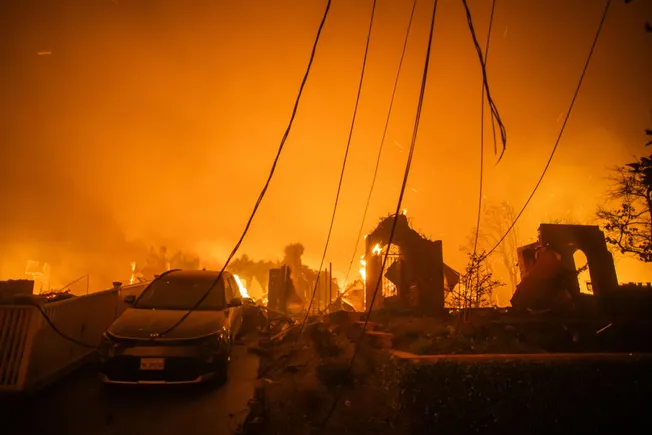Wildfires have mangled Los Angeles’ infrastructure as they continue to rage in parts of the area, spurred by high winds and supercharged by climate change. Though it’s still too early to take full stock of the impact, the fires have killed at least 24 people, displaced over 100,000 residents and destroyed at least 12,000 structures, according to The Guardian.
Those numbers are likely to grow: The National Weather Service issued red flag warnings for severe fire conditions through Wednesday, which could set back progress.
The conflagrations have thus far consumed more than 62 square miles — an area larger than San Francisco — as firefighters continue to battle for control of the two biggest fires, the Palisades Fire and Eaton Fire, according to AP News. No government agencies have yet provided a cost estimate of the damage, but AccuWeather puts that number, including economic loss, between $250 billion and $275 billion — making them the costliest fires in U.S. history.
The area’s sewer, water and power infrastructure has been significantly damaged, LA County Public Works Director Mark Pestrella said at a Jan. 9 briefing, as crews worked to restore utilities. Massive amounts of debris, including thousands of fallen trees and materials from burned structures, must be removed before repairs can begin, Pestrella said.
LADPW is leading the debris removal effort, and the agency plans to conduct a health review of every property affected by the fire, Pestrella said.
The fires have heavily impacted roads, damaging traffic signals and downing wires, Janisse Quiñones, CEO and chief engineer of the LA Department of Water and Power, said Jan. 9. A slew of roads across the LA area are closed due to the blazes, per the LADPW’s website.
The fires also knocked out power for hundreds of thousands of people, and while crews have restored access for many as of Tuesday, there are still nearly 20,000 LADPW customers without power as of Tuesday, PowerOutage.us shows.
Most of those outages are in the Pacific Palisades and Brentwood neighborhoods, per the LA Department of Water & Power tracker. Additionally, some electrical transmission and distribution equipment has been shut down for the safety of firefighters.
Water infrastructure hit
LA’s water infrastructure has come under scrutiny amid the fires, and misinformation has raged just as fast. However, as fire hydrants ran dry in Palisades last week, the crux of the problem was not an overall lack of water reserves but rather a pump-and-storage system designed to fight fire at several homes, not a blaze that would rapidly consume hundreds of structures, according to the New York Times.
Water for hilly communities like Palisades is collected in a reservoir that pumps into high-elevation storage tanks. However, those storage tanks and the pumping systems that feed them could not keep pace with the demand as the fire raced from one neighborhood to another, the Times reported. In part, that was because those who designed the system did not account for the “stunning speeds” at which multiple fires blazed through the area.
Indeed, area water reservoirs are full and being used for firefighting, but ash and other materials have contaminated some reserves, Quiñones said. The agency issued a “do not drink” warning Friday for Pacific Palisades and surrounding neighborhoods due to fire-related contamination.
Large urban fires can melt and otherwise damage pipes, causing them to leak large amounts of water and drain pressure from the system, which typically keeps out harmful elements. Loss of that critical pressure can allow ash, smoke, soot and other toxic debris and gases to get sucked into the network of pipes, per AP News.
That loss of pressure can also impact water availability for firefighting. Hydrants ran dry in Pacific Palisades as homes burned, which LADPW pinned on high demand as well as loss of water pressure. The agency said pump stations were working and water supply remained strong to the area, though California Gov. Gavin Newsom said the state will investigate. One lawsuit has already been filed alleging LADPW failed to properly manage water supplies.
Meanwhile, the LADPW is continuing to deploy water tankers to assist firefighters, LA Mayor Karen Bass said at a press briefing on Monday.
What comes next?
Construction companies are poised for recovery and rebuilding efforts.
AECOM is supporting FEMA’s Public Assistance grant program, which is focused on repairing and replacing damaged public infrastructure after catastrophic disasters. Jacobs also nabbed a five-year, $570.5 million FEMA contract to provide hazard mitigation support and to rebuild infrastructure in various areas, including California. Both contracts preceded the fires.
Historically, Pasadena, California-based civil engineering firm TetraTech has also provided disaster and emergency recovery services across the country, Milwaukee, Wisconsin-based financial services company Baird noted in a briefing.
Electric grid contractors will also be in high demand, according to Baird.
“Most of this work is performed under existing master service agreements with major utilities, in which crews are dispatched from across the country to assist with power restoration services following major storms and other natural disasters,” Baird’s briefing said.
